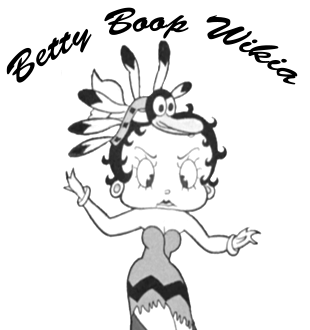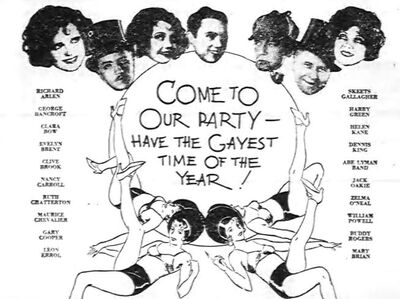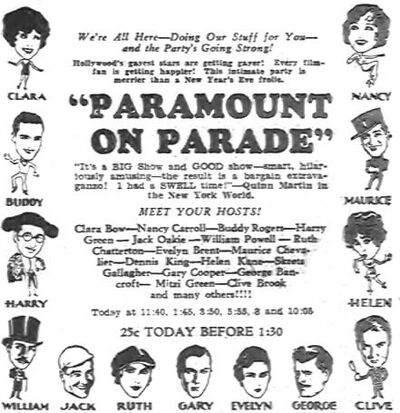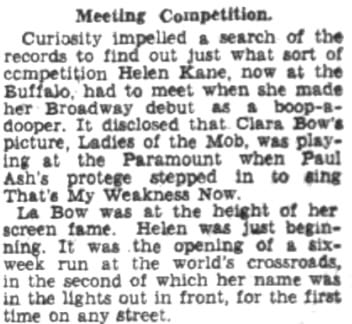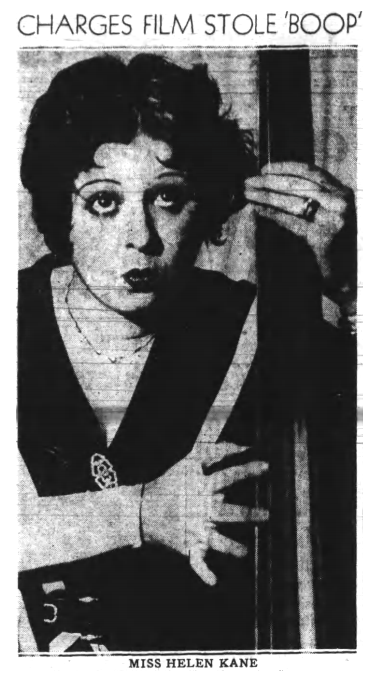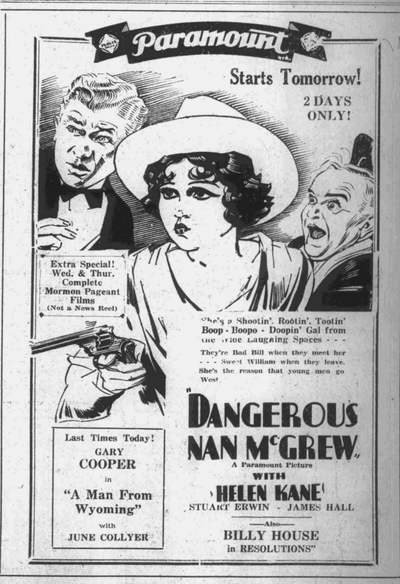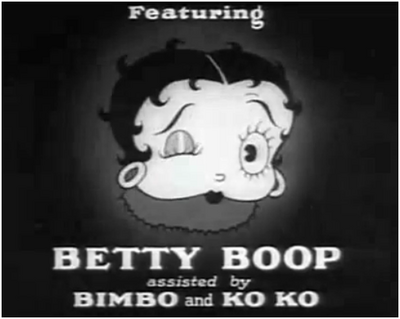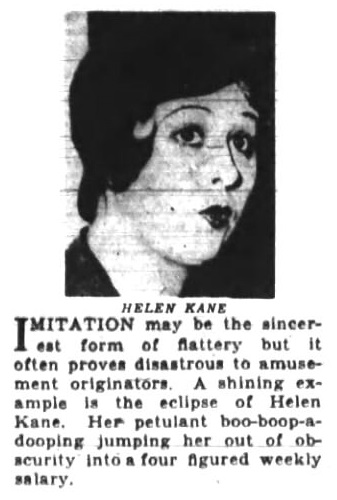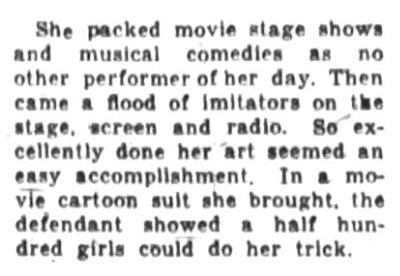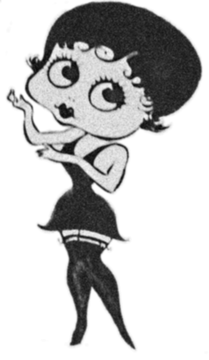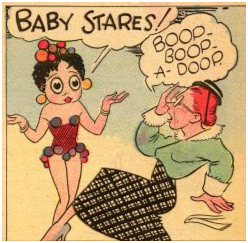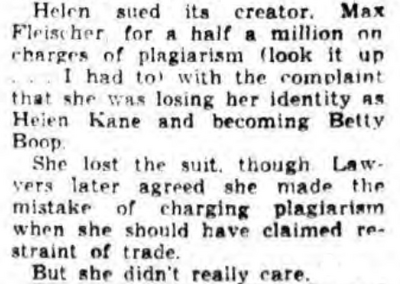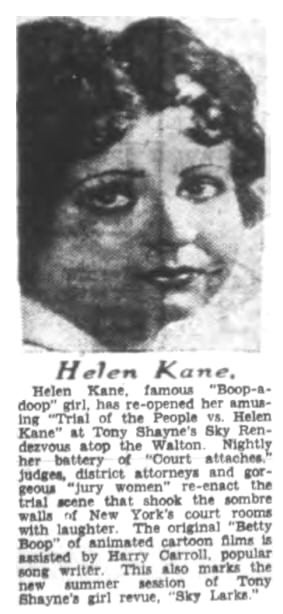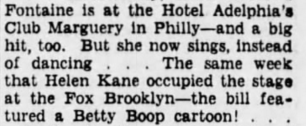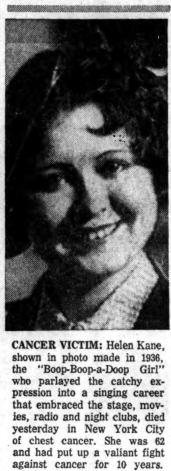| Helen Kane | |
|---|---|
 | |
|
Name |
Helen Kane |
| Helen Kane | |
|---|---|
 | |
|
Name |
Helen Kane |
Helen Kane was an actress and singer who became popular in the 1920s. In May 1932, Kane filed a $250,000 Infringement Lawsuit against Max Fleischer and Paramount Publix Corporation for the "deliberate caricature" that produced "unfair competition". While Kane had risen to fame in the late 1920s as "The Boop-Boop-a-Doop Girl", a star of stage, recordings and films for Paramount, her career was nearing its end by 1931, with her last Paramount feature being A Lesson In Love. Paramount promoted the development of Betty Boop following Kane's decline. The case was brought in New York in 1934. Although Kane's claims seemed to be valid on the surface, it was proven that her appearance was not unique as both Kane and the Betty Boop character bore resemblance to Paramount top-star Clara Bow. On April 19, Fleischer testified that Betty Boop was purely a product of the imaginations of himself and detailed by members of his staff. Little Ann Little, Bonnie Poe, Kate Wright, Margie Hines, and most notably Mae Questel were all summoned to testify. The case dragged on for more than two years before the judge ruled against Kane, claiming her testimony did not prove that her singing style was unique and not an imitation itself; Kane was asked if she had taken her "scat" lyrics idea from Felix Mayol's 1913 recording "Bou Dou Ba Boum", which she denied. Another witness claimed that Edith Griffith had "Booped" before Kane in a early recording. An African-American child performer from Chicago known as "Baby Esther" originally billed (Lil Esther) was cited by the defense as "Booping" in song, with Kane having seen Esther's cabaret show in the 1920s and swiping her act, becoming popular overnight. This was what the defense explained when they showed an early test sound film featuring Baby Esther. In the actual court documents it states that the motion picture that was shown in court featuring Esther performing her own unique song which was "Wa-Da-Da". But it also states that she is performing two Helen Kane songs which are; "Don't Be Like That" and "Is There Anything Wrong In That?". This information has been hidden from the public and can only be accessed by reading through the lawsuit documents. Helen Kane later told the press that she was shocked and disappointed, remarking that both she and her friends were convinced that the Betty Boop cartoons were a deliberate caricature of her.
Quotes
- Helen Kane: "I started Booping about 1928 on the radio and screen. Later 20,000,000 persons knew me as the Boop girl. Then came Betty Boop a cartoon and I almost lost my identity." ($250,000 Infringement Lawsuit)
- Helen Kane: "The younger generation that loves Boops hardly remembers my Boops. They even call me Betty Boop, after the cartoon character." ($250,000 Infringement Lawsuit)
- Helen Kane: "Of course I'm the original Boop girl! I began Booping about 1928. My Boops earned me as much as $25,000 a week. Here's how I Boop!" ($250,000 Infringement Lawsuit)
- Helen Kane: "I just put Boop-Boop-a-Doop in at one of the rehearsals, a sort of interlude. It's hard to explain - I haven't explained it to myself yet. It's like Vo-De-O-Do, Crosby with Boo-Boo-Boo, and Jimmy Durante with Cha-Cha-Cha."
- Helen Kane: "I am MAD!, MAD!, MAD! I am so mad! I am going to spend a lot of money appealing this case."
- Helen Kane: "They have stolen my idea! I don't need money. I sued these Betty Boop people for $250,000, I don't want a cent of it. All I want is vindication. It has broken my heart."
- Helen Kane: "When I listen to this rock and roll and look at you kids, I don't think it's a whole lot different than the Charleston and the Varsity Drag."
- Helen Kane: "I know when I was a kid, I used to look at these pictures and listen to the songs of the Gay Nineties, and I used to say to my mother, "Oh, I wish I had lived then, it was so gay and so wonderful" Now the Jazz Age seems very mysterious and wonderful to you, kids, and when you have kids, they'll say; "Gee, Dad, those 50s, they were something." I really think it goes in cycles. When your kids come in and say; "Gee, Dad, I wish we had done that, and so on and so forth," it's the same thing. I don't think its changed a great deal."
Paramount Helen Kane Look & Sound-alike Contests
Helen Kane sponsored imitation contests with Paramount through the country. Helen Kane opened her Helen Kane Impersonation Contest held through the country to all local girls in which were judged by the audience. The girl who looked and sung like Helen and "Boop-Boop-a-Dooped" most successfully was the winner. In some of the earlier contests, several of the women who would later provide the voice for Betty Boop won first place. Margie Hines the original voice of Betty Boop won first place held in a local cinema cathedral in Freeport, and was later seen by a Fleischer Studios staff member, who thought she was perfect for the role as Betty Boop. According to Helen Kane, Hines entered three "Boop-Boop-a-Doop" contests and won first place in each and every one of them and the both of them met backstage. In 1934 Kane stated that she knew Hines was the voice for Betty Boop but would not acknowledge Questel. When asked how she heard of Betty Boop, Kane stated that she had heard Betty Boop (Mae Questel) and Max Fleischer on radio and wanted to find out who was singing like her.
Mae Questel had first won first place in a Helen Kane Impersonation Contest at the RKO Fordham Theatre. There she received an autograph from Helen Kane which read "To Another Me" (To Another Helen Kane), and won a prize of $100. Mae would often substitute for Helen Kane, in the 1920s she was originally dubbed one of the greatest Helen Kane impersonators. While working in vaudeville Mae heard there was an audition taking place for the role of Betty Boop so she decided to audition and won the role. Several of the other voices of Betty also started out impersonating Kane and several others entered contests with each and every one of them winning first place. The contests were held by Kane was to help these girls start their careers in show business, to give back to the community. Because Kane grew up poor and wanted to help these girls. In the final contest held at The Riverside Theatre in New York, Questel came first, and Bonnie Poe and Margie Hines tied in second place. Helen Kane first saw Bonnie Poe impersonating her in an act. Kane and Poe later played the same bill in Chicago for three weeks. According to Jo Miller's granddaughter, her grandmother entered one of the contests to do the voice for Betty Boop but came second. The Helen Kane contests ran from 1928 to 1938. The age range to enter was 4-18.
Restrained By Court Order (1930)
Helen Kane the Queen of all the "Poop-Poop-a-Doop" coloraturas, is said to have made a $40,000 deposit in a New York bank, believed to have been given her by a dress manufacturer. She has been restrained by a court order from touching the money and is being brought back from Chicago to tell what she knows about it and the financial condition of the dress firm from which it is alleged the money came. Helen denies knowing anything about it, or that she has anything like that sum in the bank. It's all very sad and trying on a working girl.
"Boop Boop" Is Wrong! (1931)
Helen Kane says phrase is "Poop-Poop-a-Doop". Take it from Helen Kane, its inventor, the phrase isn't "Boop-Boop-a-Doop" at all, it's "Poop-Poop-a-Doop". "Somebody got it all wrong the first time," said Miss Kane as she stopped here for personal appearances. (The Pittsburgh Press )
Paramount on Parade (1930)
In 1930 Kane debuted in Paramount on Parade which featured Clara Bow, Nancy Carroll, Maurice Chevalier, Gary Cooper, Clive Brook, Skeets Gallagher, Harry Green, Jack Oakie, Zelma O'Neal, Ruth Chatterton, Leon Errol, William Powell, Buddy Rogers, Mary Brian, George Bancroft, Richard Arlen, Abe Lyman Band, Dennis King and Mitzi Green.
Two years later Kane made a small cameo appearance in the 1932 Paramount short Hollywood on Parade No. A-3, a year before Betty Boop made her live-action debut in Hollywood on Parade No. A-8.
Meeting Competition (1932)
Curiosity impelled a search of the records to find out just what sort of competition Helen Kane, now at the Buffalo, had to meet when she made her Broadway debut as a Boop-a-Dooper. It disclosed that Clara Bow's picture, Ladies of the Mob, was playing at the Paramount when Paul Ash's protege stepped in to sing "That's My Weakness Now". La Bow was at the height of her screen fame. Helen was just beginning. It was the opening of a six week run at the world's crossroads, in the second of which her name was in the lights out in front, for the first time on any street.
$250,000 Lawsuit
On the 3rd of May 1932, Helen Kane launched a three way lawsuit against the Fleischer Studios & the Paramount-Publix Corporation claiming that they had stolen her style.
"Plantiff originates and still uses a method of singing songs consisting of the interpolation at frequent intervals of the sounds Boop-Boop-a-Doop, or Boop-Boopa-Doop or Boop-Boop-Pa-Do or Boopa-Doop or simply Boop alone."
Kane filed a permanent injunction to restrain the Paramount Publix corporation, as well as Max Fleischer from the production and display of their "Boop" series. Kane's height (only 5 feet tall) and slightly plump figure attracted attention and fans. Her round face with big brown eyes was topped by black, curly hair. Her voice was a baby squeak with a distinct Bronx dialect. Oscar Hammerstein's 1928 show Good Boy was where she first introduced the hit "I Wanna Be Loved By You". In 1930, Grim Natwick introduced a caricature of Helen Kane, with droopy dog ears and a squeaky singing voice, in the cartoon Dizzy Dishes. Betty Boop as the character was later dubbed, soon became popular and the star of her own series. In 1932, Betty was changed into a human, with the long dog ears becoming hoop earrings.
Films featuring Kane used in court as evidence were Pointed Heels (1929) - Dizzy Dishes (1930), Nothing But the Truth (1929) - Boop-Oop-a-Doop (1932), Dangerous Nan McGrew (1930) - The Bum Bandit - (1931) parallel to that of the Betty Boop films. $250,000 Infringement Lawsuit for more details.
Imitation is the Sincerest Form of Flattery (1934)
Imitation may be the sincerest form of flattery but it often proves disastrous to amusement originators. A shining example is the eclipse of Helen Kane. Her petulant Boo-Boop-a-Dooping jumping her out of obscurity into a four figured weekly salary.
She packed movie stage shows and musical comedies as no other performer of her day. Then came a flood of imitators on the stage, screen and radio. So excellently done her art seemed an easy accomplishment. In a movie cartoon suit she brought, the defendant showed a half hundred girls could do her trick.
Helen Kane Comic Strip
Cartoon caricatures of Helen Kane.
In 1933, when Helen Kane learned that Betty Boop was going to star in a comic strip, she contacted King Features. See Betty Boop Comic Strip (1934-1937) for more details.
Helen Kane & Max Fleischer
According to Leslie Cabarga (who had met Mae Questel in person), Helen Kane went to Max Fleischer and said: If you use me in the cartoons instead of the other girl (Questel) I'll drop the suit. Fleischer, who knew Mae Questel, said "I won't use anyone but my Mae." According to a Brooklyn newspaper after Kane had sued Fleischer, he had not a single good word to say about her. The Brooklyn newspaper even blacklisted Kane, and stated in one article that they wasn't supposed to mention her by name but ended up doing so. Max Fleischer started out his early career as a newspaper cartoonist.
Deeply Shocked at Verdict
Helen Kane the Boop-Boop-a-Doop girl today lost her suit for $250,000 against Max Fleischer, cartoonist, the Fleischer Studios Inc., and the Paramount Publix Corporation. Supreme Justice Edward J. McGoldrick held that she had failed to prove her contention that the defendants wrongfully appropriated her singing technique in the "Betty Boop" film cartoons. Miss Kane said she was deeply shocked at the verdict. "I consider it very unfair as all my friends believe the cartoons a deliberate caricature of me," she said. Samuel R. Weltz her attorney said an immediate appeal would be filed. The "Boop-Boop-a-Doop" trial began April 17th, Miss Kane seeking damages on grounds that the defendants had used her picture in violation of the civil rights law and that the cartoons constituted "unfair competition". In the opinion of the town's faithful court ringsiders, there has never been a more melodious trial in the city. At times, during attempts to determine the origin, and even the reasons, for the "Boop" style of singing it resembled a musical comedy. The testimony given during the trial was, for the most part in two-fourths time and very syncopated. The defense presented a galaxy of talented performers to show that long before Miss Kane made her debut as a singer of "baby" songs the practice of interpolating songs with meaningless sounds was quite common.
Do-Do-De-Do-Ho-De-Wa-Da Claimed Boop-a-Doop Parent (1934)
Court stenographers who struggled to record in shorthand the "Boop-Oop-Doops" of Helen Kane were on the verge of hysterics tonight. Supreme Court Judge Edward J. McGoldrick ordered them to set down "Do-Do-De-Do-Ho-De-Wa-Da-De-Da." The "Boop-Oop-a-Doop" trial, in which Helen Kane seeks $250,000 damages from the animated cartoon creators of "Betty Boop," became this complicated when Lou Bolton testified, for the defense, Bolton testified that nine years ago in Chicago he taught Baby Esther, a negro child to interpolate "Do-Do-De-Do-Ho-De-Wa-Da-De-Da" between the bars of music in popular songs. Bolton said Miss Kane heard Baby Esther's song treatment here in 1928 and shortly afterward began her famous "Booping." Testimony also was heard today from Bonnie Poe and Margie Hines, two petite piping-voiced misses who said they were hired by the Max Fleischer studios as voices for Betty Boop after winning Helen Kane contests. Miss Hines said she won a preliminary contest before she ever heard Miss Kane. (Democrat and Chronicle)
Mistake
After Helen had lost the suit (with the complaint that she was losing her identity as Helen Kane and becoming Betty Boop), lawyers agreed that Helen had made the mistake of charging plagiarism when she should have claimed re-straint of trade.
Trial of the People vs. Helen Kane (1934)
In 1934 Helen Kane opened a show based on the $250,000 Infringement Lawsuit titled Trial of the People vs. Helen Kane, which featured Helen Kane and Harry Carroll.
Using Betty Boop's Image Without Permission
During Helen Kane's 1935 Brooklyn Fox appearances on stage, she used Betty Boop's image for her posters, and her appearance also featured a Betty Boop cartoon. It was thought that Max Fleischer should have sued her, but he did not, which allowed her to use Betty Boop's image without permission.
Kane also used Betty Boop's name again in 1942. Heading the all star floor show Helen Kane the original Betty Boop "Boop-Boop-a-Doop" girl, Paramount's $100,000 star.
Mistaken for Betty Boop
When Helen Kane made her big comeback in the 1950s, Betty Boop had been long retired and forgotten. Betty Boop the cartoon character was later rediscovered in the 1980s, 30 years later. The animated cartoon character was around in the 40s, 50s, 60s and 70s, but studios did not produce any cartoons featuring the character, she appeared in one or two commercials. It wasn't until the 80s when the fictional character Betty Boop became iconic making her first comeback in the 1985 CBS animated TV special The Romance of Betty Boop followed up four years later by Who Framed Roger Rabbit and finally one year later in The Betty Boop Hollywood Mystery. The character also made multiple appearances in commercials.
Kane was mistaken for the voice of Betty Boop, she also used to sign photos of the cartoon character and hand them out to people. She was played by Debbie Reynolds in the 1950 MGM musical Three Little Words, where she dubbed Debbie's singing voice. Kane recorded 22 songs between 1928 and 1930. After 1930 and up to 1951, she recorded four sides for Columbia Records in addition to the "Three Little Words" soundtrack single recording of "I Wanna Be Loved by You". In 1954, MGM records issued the last Helen Kane recordings as a 45-rpm Ep X1164 called "The Boop-Boop-A-Doop Girl!", orchestra directed by Leroy Holmes, and the songs are "When My Sugar Walks Down the Street", "When I Get You Alone Tonight, Do Something" (from Nothing But the Truth) and "That's My Weakness Now".
When Kane died of breast cancer in the 1960s at the age of 62 she was tributed in the newspapers. In some newspapers she was mistaken for the original voice of the animated character Betty Boop. She had put up a valiant fight against cancer for 10 years.
Universal Studios
Helen Kane's music was often used in Betty Boop's store as seen on the Betty Boop Biography, most promptly her recording of "I Wanna Be Loved By You" which is still often used at parade events, there was even a remix version of the Three Little Words song. During the 90s Universal Studios decided to give Betty Boop her own official theme songs for The Betty Boop Store, and hired Sandy Fox a high-pitched actress who had been hired by Universal Studios Hollywood to portray Betty Boop in person. Sandy used to imitate Helen Kane in a 1920s jazz band entitled The Coconut Manor Orchestra and would often open for legendary musicians, including Cab Calloway, Pete Fountain, Ray Charles and Dizzy Gillespie. She recorded several Helen Kane songs, including several renditions of "I Wanna Be Loved By You" one merged with Betty Boop's original official theme song "Don't Take My Boop-Oop-A-Doop-Away".
Helen Kane and Betty Boop Song Comparison
In the early 30s, it was quite common for many performers to use the same songs. Although these were deliberate. The 1980s song "I Wanna Be Loved By You" featured in The Romance of Betty Boop was more influenced by the iconic Marilyn Monroe, but originated with Kane in 1928 and was her signature song. Today, "I Wanna Be Loved By You" is Betty Boop's signature song even though Betty's original theme song, which was especially written for the character by Sammy Timberg, is "Don't Take My Boop-Oop-A-Doop Away".
(Helen Kane: Film Pointed Heels/Victor Records) (Betty Boop: Dizzy Dishes, Fleischer Studios/Paramount-Publix Corporation)
(Helen Kane: Film Nothing But The Truth/Victor Records) (Betty Boop: Boop-Oop-a-Doop,Fleischer Studios/Paramount-Publix Corporation)
(Helen Kane: Film Dangerous Nan McGrew) (Betty Boop: The Bum Bandit, Fleischer Studios/Paramount-Publix Corporation)
(Helen Kane: Victor Records) (Betty Boop: Stopping the Show, Fleischer Studios/Paramount-Publix Corporation)
(Helen Kane: Victor Records) (Betty Boop: The Romance of Betty Boop, CBS)
Trivia
- Kane's original scat lyrics were "Poop Poop Padoop", but everyone including news reporters misunderstood, so she changed her lyrics from "Poop" to "Boop". Poop can clearly be heard in many of her original film appearances.
- Kane wanted to show the judge that the defendants had made a studied imitation of her style, eye movements and general mannerisms, and how Betty Boop had simulated her voice and style, but she failed due to lack of evidence and the recording of Baby Esther uttering the scat lyrics. However animator Grim Natwick who created Betty used Helen as base for his character, and stated that he had used her in several of his interviews. Grim created the character but didn't own the rights, Betty was owned by the Fleischer Studios.
- Since Kane was very popular in 1928-1931, she had many impersonators, including Annette Hanshaw who often mimicked her on a few anonymous songs. Kate Wright, who later provided the voice for Betty Boop in a few cartoons, also imitated Kane as The Mystery Girl in 1929 for Colbumbia Records.
- Kane also allowed for her impersonation by holding look and sound-alike contests, held by herself & Paramount Publix. Mae Questel won first prize in one of the contests and was given a signed autograph which stated "To another Kane", which allowed the use to impersonate her. It has also been attested that Kate Wright, Little Ann Little, Margie Hines and Bonnie Poe also entered one of the contests held by Kane and Paramount.
- Kane wanted Betty Boop stopped by injunction.
- Kane's popularity had decreased by 1933. She claimed other people (meaning Helen Kane impersonators) were stealing all the jobs that would have originally have gone to her. By 1934-1935 Kane was performing back on stage, lost much weight and retired from showbusiness for a period, and even refused to utter any more "baby talk" after losing her lawsuit.
- Kane made a comeback in MGM's Three Little Words as herself, embodied by Debbie Reynolds while dubbing over the singing voice to her 1920s hit "I Wanna Be Loved By You".
- When Helen Kane died in 1966, she was confused in the newspapers for being the original voice of Betty Boop.
- Helen Kane was also known as "Helen Sugar Kane". In the 1950 film Some Like It Hot, Marilyn Monroe plays a character that was influenced by Kane, called "Sugar Kane"; there, Monroe performs Kane's hit "I Wanna Be Loved By You" with the latter's actual original scat lyrics, which were "Poop".
- In the 1980s, Betty Boop made a big comeback. Kane was forgotten to time, but then Cyndi Lauper brought her back and was also influenced by Kane's 1929 hit "He's So Unusual" and used it for her album "She's So Unusual".
- When Betty Boop made her 1980s comeback, her signature song and quote became "I Wanna Be Loved By You".
Links
- Helen Kane the Original Boop-Oop-a-Doop Girl
- Helen Kane (Singer of "I Wanna Be Loved By You")
- The Real Betty Boop (2016)
See Also
- Out-Kaned Kane (1930)
- Protect Her Rights In Boop-a-Dooping (1932)
- Charges Stole Boop (1932)
- Miss Kane and Betty Boop (1933)
- Helen Kane Hears Betty Boop Trial (1934)
- Artist Denies Miss Kane Was His Inspiration (1934)
- Five Betty Boops Silent In Court (1934)
- Sings Her Boop-a-Doop in Court (1934)
- Boop Vs Boop May the Best Boop Win (1934)
- She Was Not So Original (1934)
- Court Dismisses $250,000 Suit of Helen Kane (1934)
- A Boop and a Poop (1935)
- Helen Kane Uses Betty Boop For Her Fox Brooklyn Personal Appearance (1935)
- Ironic Last Echo of Boop-Boop-a-Doop (1935)
- Are Helen Kane and Mae Questel One and the Same? (1935)

